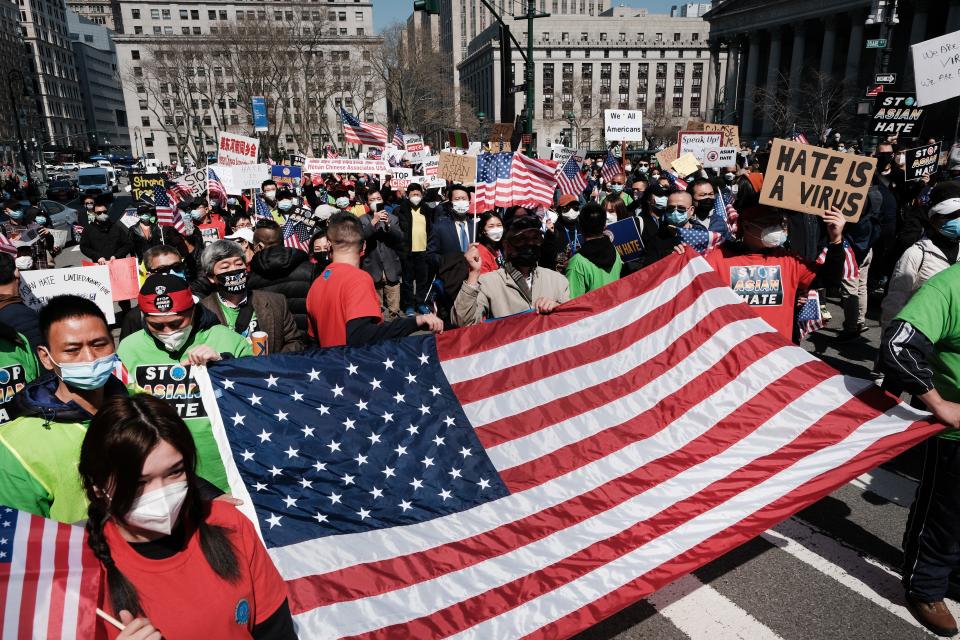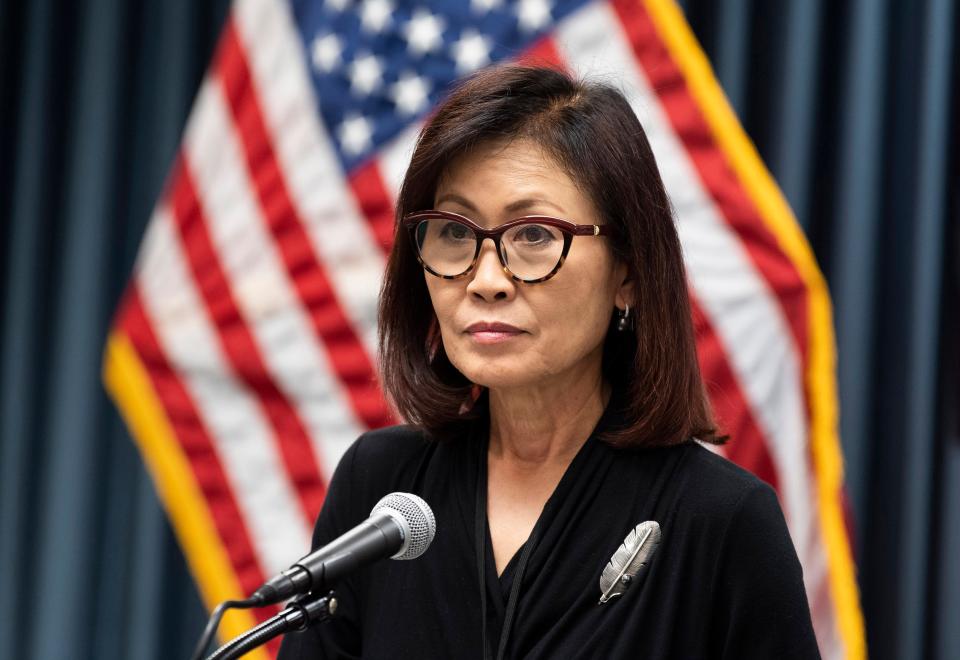With sour economy, Republicans see opening with Asian American voters in midterm elections
This week, the Republican National Committee opened its 37th minority outreach center in the country in Issaquah, Washington.
The target audience? Asian American voters who traditionally lean Democratic but who could also hold the key for a Republican victory in this suburban Seattle congressional district up for grabs this November.
Asian Americans and Pacific Islanders make up about 7% of the population nationwide, but their presence in battleground areas like Washington state's 8th Congressional District makes them even more important during the midterm elections.
Asian American and Pacific Islander constituents, who make up 11% of the swing district, are a crucial voting bloc if the GOP wants to win the district, Washington State Republican Party chairman Caleb Heimlich told USA TODAY.
"Too often our party hasn't really showed up," he said. "I think there's a lot of areas where we can win voters over but in order to do that, you obviously have to show up and talk to the voters and ask them for their vote. So this office opening today is a big part of continuing that dialogue."
The outreach is emblematic of a larger push by the Republican party to win over Asian American voters nationwide in the midterms. Heimlich noted that "it's been over a decade since the RNC has really made any investment in Washington State at all."
And it's not just the Pacific Northwest.
"Democrats have taken APA voters for granted for far too long – we want to put down roots in this community, have a conversation, and earn your vote," said RNC chairwoman Ronna McDaniel.
Republicans believe that President Joe Biden’s low approval rating coupled with the prominence of three key issue areas they see as essential to Asian American and Pacific Islander voters can push them to new levels of support: the economy, crime and education. The campaign is accompanied by an effort to elect more AAPI Asian American and Pacific Islander candidates to Congress, and build a bench of Asian Republicans in local and state offices.
They saw signs of success last cycle, with the election of two of the first Korean congresswomen. But it's no easy task, given Asian American and Pacific Islander voters typically vote Democratic, and a majority of those voters in a recent poll said they haven’t been contacted by the Republican party in the past year – in spite of amped-up efforts from the GOP campaign committees.
Fastest growing voting block
As the fastest growing racial or ethnic group in the country, both parties are eager to make further inroads with the group in the midterm elections.
In 2020, 59% of non-Hispanic Asians voted, compared to 49% in 2016, the largest increase across all racial groups. They helped deliver Democrats the White House and control of the Senate in the two Georgia runoffs.
A USA TODAY/Suffolk University Poll released earlier this month found Biden's approval rating at 39%-56% among all voters. A series of legislative wins in Congress and declining gas prices have bumped up support for the president, but historical trends still suggest that Republicans are likely to regain control of the House and could also win control of the Senate.
Asian American voters are not a homogenous bloc. In a recent AAPI Data poll, for example, 26% of Asian American respondents overall identified as Republican, compared to 39% of Vietnamese respondents, 32% of Filipino respondents and 31% of Korean respondents. Just 18% of Chinese respondents and 20% of Indian respondents identified as Republican.
The same biannual national poll of 1,610 registered Asian American voters found that 52% of Asian respondents had not been contacted by the Democratic party about the midterm elections, and 60% had not been contacted by the Republican party (the survey was conducted between April and June).
The GOP pitch to voters

Republicans say that widespread voter worry about the economy and rising inflation will help them appeal in particular to Asian voters. Nearly 9 in 10 - 86% - of Asian voters in the AAPI Data poll said that jobs and the economy are "very" or "extremely" important in deciding how to vote.
Following a rise in anti-Asian hate crimes during the coronavirus pandemic, GOP candidates also hope their appeal for more policing and stricter public safety policies helps sway Asian American and Pacific Islander voters. Asian American voters were key to the successful effort to recall progressive San Francisco District Attorney Chesa Boudin earlier this summer, with a local poll by the San Francisco Standard finding they were the likeliest racial group to support the effort.
Rounding out the Republican pitch to Asian voters ahead of November is a focus on education, centered around school choice and an upcoming Supreme Court case on affirmative action brought by a group alleging racial discrimination against Asian American and Pacific Islander students by Harvard University.
Affirmative action: Supreme Court to consider use of race in college admissions
“Like any family across the country, Asian American families are fed up – they want safe streets, the best schools for their children, low taxes, and the opportunity to achieve the American Dream,” former Ambassador to the United Nations Nikki Haley, one of the highest ranking Republican Asian American and Pacific Islander former officials, said in a statement to USA TODAY.

“Conservatives have the solutions to lift up everyone, that’s why you’ll see more Asian Americans running for office and voting Republican,” said Haley, a possible 2024 presidential candidate.
“Republicans are laser-focused on the issues that matter most to working Americans like out-of-control inflation. We’re the party of law enforcement, we’re the party that supports merit-based education, and that’s always been the case," said Nainoa Johsens, the director of Asian Pacific American media for the Republican National Committee.
Devil in the details
“In the 2022 election, focusing on the economy, crime, and education makes sense. The devil behind such an outreach strategy, however, is surely in the details,” said Taeku Lee, the Bae family professor of government at Harvard University.
“If Republican candidates address crime solely with negative attacks on Democrats as the ‘defund the police’ party, they have to keep in mind that a large majority of Asian American and Pacific Islander voters support Black Lives Matter and favor reforms that would hold the police more accountable for incidents of violence,” noted Lee, who focuses on Asian American politics.
Likewise, on the economy, Lee said, “If Republican candidates address the economy solely with negative attacks on the current state of the economy, they have to keep in mind that a large majority of Asian American and Pacific Islander voters support various parts of the infrastructure bill and the recently passed Inflation Reduction Act.”
Ruchelle Buenaventura, a research scientist in Arlington, Virginia, who votes Democratic, sees the messaging from the Republican party about crime as a type of insincere marketing.
"Sometimes you can kind of see what messages are saying versus what their actual intention is," said Buenaventura, who is Filipino-Chinese. "If you really cared about Asian American safety, maybe there'd be other things that you would do versus just using it as a targeted mechanism in order to get a vote."
Community centers and closing the gap
Republicans have launched several new initiatives to try to reach out to Asian American and Pacific Islander voters this cycle, including through community centers opened by the RNC in Asian communities. The centers include locations like North Texas, targeting Indian American voters; Little Saigon in Orange County; and the suburbs of Las Vegas and Atlanta.
The committee last month kicked off a separate program to prepare immigrants to prepare for the naturalization test. Following naturalization, such immigrants are then legally allowed to vote.
“It used to be the case that a much higher proportion of that outreach from parties came from Democrats than did so from Republicans. (The 2020 election) marked a potential turning point, where both parties appear to actively reach out to AAPI voters,” said Lee.
“While it is still the case that Democrats are likelier to reach out to AAPIs than Republicans, that gap has closed substantially,” he said, comparing 2020 to 2016.
Democrat Jenny Snyder, a Korean American podcast producer in Los Angeles, said the GOP outreach should not be dismissed.
"I think it's a very pointed, strategic approach and I don't really see that kind of strategy coming leftist independent parties, or the Democrats either," she said.
“We’re here to listen to their concerns first, we’re not there to demand a vote, we’re there to listen and have a conversation in the long run,” Johsens told USA TODAY. "And when the time comes, we’ll be able to provide the resources to register to vote, to be able to volunteer to make phone calls, and those type of things.”
Ritesh Desai, a Georgia Republican who spoke at the opening of a community center in Berkeley Lake, Georgia, said attendees at the center have included those who don’t identify as Republicans or are new to voting. Events at the centers are generally closed to the press, with little public information about what goes on. Desai said events in Berkeley Lake have included a round table with religious leaders in the community.
2020 blueprint in Kim and Steel wins

The other side of the GOP effort to make inroads with Asian voters focuses on candidate recruitment. In 2020, Republican Reps. Young Kim and Michelle Steel made history in Southern California, flipping two Democratic-held seats and becoming the first GOP Korean American women elected to Congress.
“I think one of the biggest shifts we've seen in recent cycles is that it's no longer talking points, there is a legitimate path to victory. So like, if it's a legitimate path to victory, then you put resources into it,” Republican strategist Sam Oh, who helped orchestrate the two wins, told USA TODAY. “They showed a blueprint that we can win these tough seats in a place like California.”
Kim's message to Asian American voters is the same for all voters: the GOP is better positioned to improve the economy.
“The Republican Party is the Grand Opportunity Party that is working on pro-growth policies to make life affordable, keep communities safe and ensure future generations can pursue their American dream,” Kim said in the statement.
Kim and Steel’s identities – as immigrants and best friends long before they won an election – have been central to their campaigns.

“With Vietnamese voters, we talked pretty extensively about Steel’s personal story where her parents fled North Korea, and the communism component to that, as that’s a major issue within these communities to this day by being in a refugee community,” Oh said.
Candidate recruitment and building the bench
Republicans hope to build off their wins with Asian American and Pacific Islander candidates in 2020. Both Kim and Steel are running for reelection in redrawn districts, both against Asian American and Pacific Islander Democratic candidates.
In Rhode Island and Indiana, two Asian American and Pacific Islander GOP candidates could follow in their footsteps and flip seats currently held by Democrats.
The nonpartisan Cook Political Report ranks Rhode Island's 2nd congressional district and Indiana's 1st congressional district as "toss-up" seats.
In Rhode Island, Allan Fung, the former mayor of Cranston, is running a competitive campaign in the GOP primary to replace retiring Rep. James Langevin, a Democrat.
Fung previously ran for governor in 2014 and easily won the area making up Langevin's district. A Boston Globe/Suffolk University poll in mid-June showed Fung leading Democratic frontrunner Seth Magaziner, 45%-39%.
Air Force veteran Jennifer-Ruth Green is running in Indiana against Democratic incumbent Rep. Frank Mrvan. Green, who is mixed race, is seen as a top recruit and is one of the fewer than 150 African American professional female pilots in the entire country.
Other GOP congressional candidates nationwide include Hung Cao, a Vietnamese refugee and former Navy captain running in Virginia’s 10th congressional district and Hmong refugee May Lor Xiong in Minnesota's 4th congressional district.
But the effort isn’t limited to federal office, or statewide (such as Lanhee Chen, a Republican running for state controller in California, whom many view as a top recruit). The Republican State Leadership Committee is attempting to build a bench in the states, with a number of candidates running down ballot, especially in California and Georgia.
A 2021 report by the Reflective Democracy Campaign, a group that compiles demographic data, found that Asian Americans and Pacific Islanders make up less than one percent of elected officials. There are at least 29 Asian candidates running as Republicans this cycle.
"As a party, I feel we need to evolve," said Oh.
"We need to continue doing so with these growing minority-heavy districts, because I think we do have the right messages, and that we just need more resources getting that message out and promoting really strong candidates."
This article originally appeared on USA TODAY: Republicans court Asian American voters in midterm election

